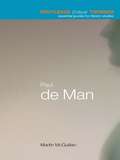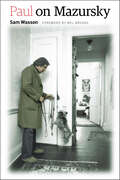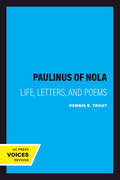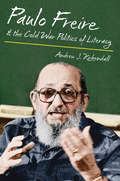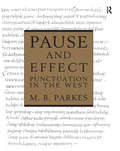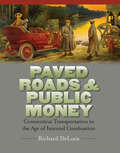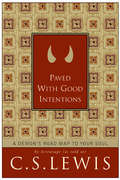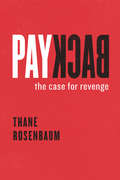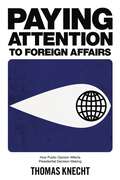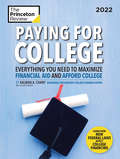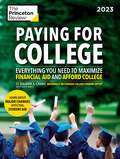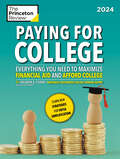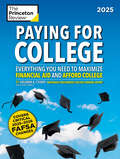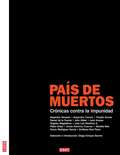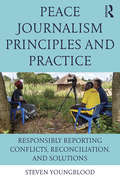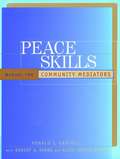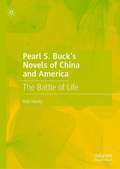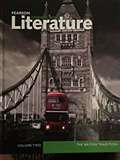- Table View
- List View
Paul de Man: Paul De Man Notebooks (Routledge Critical Thinkers)
by Martin McQuillianPaul de Man's work is key to the American deconstruction movement and to the so-called political turn in critical theory. Seventeen years after his death, his works continue to arouse violent reactions among critics. This book explains why de Man is such an important voice, detailing his critical position, exploring his intellectual and historical contexts, tracing the influence of his work and enabling readers to undertake independent study of his criticism.
Paul on Mazursky (Wesleyan Film)
by Sam WassonPaul Mazursky's nearly twenty films as writer/director represent Hollywood's most sustained comic expression of the 1970s and 1980s. But they have not been given their due, perhaps because Mazursky's films—both sincere and ridiculous, realistic and romantic—are pure emotion. This makes films like Bob & Carol & Ted & Alice, An Unmarried Woman, and Enemies, A Love Story difficult to classify, but that's what makes a human comedy human. In the first ever book-length examination of one of America's most important and least appreciated filmmakers, Sam Wasson sits down with Mazursky himself to talk about his movies and how he makes them. Going over Mazursky's oeuvre one film at a time, interviewer and interviewee delve into the director's life in and out of Hollywood, laughing, talking, and above all else, feeling—like Mazursky's people always do. The book includes a filmography and never-before-seen photos.
Paulette in Space
by Joan Fleiss Kaplan"These appealing decodable stories nurture early literacy development, which translates into building new readers' self-confidence. This, in turn, quickens the pace at which genuine reading comprehension is achieved ..."--Epsbooks.com.
Paulinus of Nola: Life, Letters, and Poems (Transformation of the Classical Heritage #27)
by Dennis E. TroutThis study offers a comprehensive reconsideration of the life and literary works of Paulinus of Nola (ca. 352-431), a Roman senator who renounced his political career and secular lifestyle to become a monk, bishop, impresario of a saint's cult, and prominent Christian poet. Dennis Trout considers all the ancient materials and modern commentary on Paulinus, and also delves into archaeological and historical sources to illuminate the various settings in which we see this late ancient man at work. This vivid historical biography traces Paulinus's intellectual and spiritual journey and at the same time explores many facets of the late ancient Roman world.In addition to filling out the details of Paulinus's life at Nola, Trout looks in depth at Paulinus before his ascetic conversion, providing a new assessment of this formative period to better understand Paulinus's subsequent importance within the influential ascetic and ecclesiastical circles of his age. Trout also highlights Paulinus's place in the swirl of rebellions and heresies of the time, in the pagan revival of the 390s, and especially in the development of a new genre of Christian poetry. And, he examines anew Paulinus's relationships with such figures as Jerome, Rufinus, and Augustine. Trout fully explores the complexity of a figure who has too often been simplified and provides new insights into the kaleidoscopic character of the age in which he lived.
Paulo Freire & the Cold War Politics of Literacy
by Andrew J. KirkendallIn the twentieth century, illiteracy and its elimination were political issues important enough to figure in the fall of governments (as in Brazil in 1964), the building of nations (in newly independent African countries in the 1970s), and the construction of a revolutionary order (Nicaragua in 1980). This political biography of Paulo Freire (1921-97), who played a crucial role in shaping international literacy education, also presents a thoughtful examination of the volatile politics of literacy during the Cold War. A native of Brazil’s impoverished northeast, Freire developed adult literacy training techniques that involved consciousness-raising, encouraging peasants and newly urban peoples to see themselves as active citizens who could transform their own lives. Freire’s work for state and national government agencies in Brazil in the early 1960s eventually aroused the suspicion of the Brazilian military, as well as of U. S. government aid programs. Political pressures led to Freire's brief imprisonment, following the military coup of 1964, and then to more than a decade and a half in exile. During this period, Freire continued his work in Chile, Nicaragua, and postindependence African countries, as well as in Geneva with the World Council of Churches and in the United States at Harvard University. Andrew J. Kirkendall’s evenhanded appraisal of Freire’s pioneering life and work, which remains influential today, gives new perspectives on the history of the Cold War, the meanings of radicalism, and the evolution of the Left in Latin America. In the twentieth century, illiteracy and its elimination were political issues important enough to figure in the fall of governments (as in Brazil in 1964), the building of nations (in newly independent African countries in the 1970s), and the construction of a revolutionary order (Nicaragua in 1980). This political biography of Paulo Freire (1921-97), who played a crucial role in shaping international literacy education, also presents a thoughtful examination of the volatile politics of literacy during the Cold War. A native of Brazil’s impoverished northeast, Freire developed adult literacy training techniques that involved consciousness-raising, encouraging peasants and newly urban peoples to see themselves as active citizens who could transform their own lives. Freire’s work for state and national government agencies in Brazil in the early 1960s eventually aroused the suspicion of the Brazilian military, as well as of U. S. government aid programs. Political pressures led to Freire's brief imprisonment, following the military coup of 1964, and then to more than a decade and a half in exile. During this period, Freire continued his work in Chile, Nicaragua, and postindependence African countries, as well as in Geneva with the World Council of Churches and in the United States at Harvard University. Andrew J. Kirkendall’s evenhanded appraisal of Freire’s pioneering life and work, which remains influential today, gives new perspectives on the history of the Cold War, the meanings of radicalism, and the evolution of the Left in Latin America.
Pause and Effect: An Introduction to the History of Punctuation in the West
by M.B. ParkesFrom its publication in 1992 Pause and Effect has become a cornerstone of the study of punctuation across the world. Described as 'magisterial' by Lynne Truss in her best-selling Eats, Shoots and Leaves, this book has stimulated interest and scholarly debates among writers, literary critics, philosophers, linguists, rhetoricians, palaeographers and all those who study the use of language. To celebrate this extraordinary achievement, Pause and Effect has been republished in September 2008, coinciding with the publication of the author's new work, Their Hands Before Our Eyes. The first part of Pause and Effect identifies the graphic symbols of punctuation and deals with their history. It covers the antecedents of the repertory of symbols, as well as the ways in which the repertory was refined and augmented with new symbols to meet changing requirements. The second part offers a short general account of the principal influences which have contributed to the ways in which the symbols have been applied in texts, focusing on the evidence of the practice itself rather than on theorists. The treatment enables the reader to compare usages in different periods, and to isolate the principles which underlie the use of punctuation in all periods. The examples and plates which are at the core of the book provide the reader with an opportunity to test the author's observations. The examples are taken from a wide range of literary texts from different periods and languages. Latin texts are accompanied by English translation intended to illustrate the use of punctuation in the originals in so far as this is possible.
Paved Roads & Public Money: Connecticut Transportation in the Age of Internal Combustion (The Driftless Connecticut Series & Garnet Books)
by Richard DeLucaPaved Roads & Public Money describes the evolution of transportation systems in modern Connecticut. It is the second book in a two-volume study that begins with the bicycle craze of the 1880s, and ends with the efforts of the Malloy and Lamont administrations to revitalize Connecticut transportation in the twenty-first century. The story includes aviation, highways, bridges, ferries, steamboats, canals, railroads, electric trolleys, and water ports in Connecticut and along the multi-state travel corridor from New York to Boston. Drawing on a wide array of primary material, Richard DeLuca examines how land, law, and technology have shaped the state and its transportation systems, giving special attention to the state's two largest transportation monopolies: the New Haven Railroad and the Connecticut Department of Transportation. The book focuses on key events in the development of transportation and legislation. It is arranged chronologically, and by highlighting themes from each period shows the implications of the state's transportation history on current debates about infrastructure and funding. It features 50 illustrations and three appendices: population by geomorphic region, a list of controlled access highways, and a list of notable highway bridges.
Paved with Good Intentions
by C. S. LewisTemptation and Deception Made Easy The demon Wormwood first became famous through his correspondence with his uncle Screwtape, published in The Screwtape Letters. We are now privileged to peruse his field notebook from that demonic training session, complete with scribbles, notes, and excerpts from his uncle's letters. Wormwood's instructions, mission statements, and maxims for special occasions create a "best of Screwtape" that offers witty and cutting strategies for how best to corrupt a brand new Christian and steal him from the "Enemy" -- God. If the best defense is to know your opponent's game book, this is a must read for all those who want to retain their souls.
Payback: Debt and the Shadow Side of Wealth (The CBC Massey Lectures)
by Margaret AtwoodAvailable in a new edition and with an introduction by Margaret Atwood, Payback delivers a surprising look at the topic of “debt” — a subject that continues to be timely.Legendary novelist, poet, and essayist Margaret Atwood delivers a surprising look at the topic of “debt” — a subject that continues to be timely during this current period of economic upheaval. In her intelligent and imaginative approach to the subject, Atwood proposes that “debt” is like air — something we take for granted and never think about until things go wrong.This is not a book about practical debt management or high finance, although it does touch upon those subjects. Rather, it goes far deeper into an investigation of debt as a very old, very central motif in religion, literature, and the structure of human societies. By looking at how debt has informed our thinking from preliterate times to the present day, through the stories we tell to our concepts of “revenge” and “sin” to the way we structure our social relationships, Atwood shows that this idea of what we owe — in other words, “debt” — is possibly built into the human imagination as one of its most dynamic metaphors. In the final section, Atwood touches upon not only our current global financial situation, but also the concept of our “debt to nature” and how our ideas of ownership and debt must be changed if we are to find a new way to interact with our natural environment.
Payback: The Case for Revenge
by Thane RosenbaumWe call it justice—the assassination of Osama bin Laden, the incarceration of corrupt politicians or financiers like Rod Blagojevich and Bernard Madoff, and the climactic slaying of cinema-screen villains by superheroes. But could we not also call it revenge? We are told that revenge is uncivilized and immoral, an impulse that individuals and societies should actively repress and replace with the order and codes of courtroom justice. What, if anything, distinguishes punishment at the hands of the government from a victim’s individual desire for retribution? Are vengeance and justice really so very different? No, answers legal scholar and novelist Thane Rosenbaum in Payback: The Case for Revenge—revenge is, in fact, indistinguishable from justice. Revenge, Rosenbaum argues, is not the problem. It is, in fact, a perfectly healthy emotion. Instead, the problem is the inadequacy of lawful outlets through which to express it. He mounts a case for legal systems to punish the guilty commensurate with their crimes as part of a societal moral duty to satisfy the needs of victims to feel avenged. Indeed, the legal system would better serve the public if it gave victims the sense that vengeance was being done on their behalf. Drawing on a wide range of support, from recent studies in behavioral psychology and neuroeconomics, to stories of vengeance and justice denied, to revenge practices from around the world, to the way in which revenge tales have permeated popular culture—including Hamlet, The Godfather, and Braveheart—Rosenbaum demonstrates that vengeance needs to be more openly and honestly discussed and lawfully practiced. Fiercely argued and highly engaging, Payback is a provocative and eye-opening cultural tour of revenge and its rewards—from Shakespeare to The Sopranos. It liberates revenge from its social stigma and proves that vengeance is indeed ours, a perfectly human and acceptable response to moral injury. Rosenbaum deftly persuades us to reconsider a misunderstood subject and, along the way, reinvigorates the debate on the shape of justice in the modern world.
Paying Attention to Foreign Affairs: How Public Opinion Affects Presidential Decision Making
by Thomas KnechtDo American presidents consider public opinion when making foreign policy decisions? In a democracy, it is generally assumed that citizen preferences inform public policy. For a variety of reasons, however, foreign policy has always posed a difficult challenge for democratic governance. In Paying Attention to Foreign Affairs, Thomas Knecht offers new insights into the relationship between public opinion and U.S. foreign policy. He does so by shifting our focus away from the opinions that Americans hold and toward the issues that grab the public’s attention. Policy making under the glare of public scrutiny differs from policy making when no one is looking. As public interest in foreign policy increases, the political stakes also rise. A highly attentive public can then force presidents to choose foreign policies that are less politically risky but usually less effective. By tracking the ebb and flow of public attention to foreign policy, this book offers a method of predicting when presidents are likely to lead, follow, or simply ignore the American public.
Paying for College, 2022: Everything You Need to Maximize Financial Aid and Afford College (College Admissions Guides)
by The Princeton Review Kalman ChanyA SMARTER WAY TO PAY FOR COLLEGE. Take control of your financial aid experience with this essential guide—the only annual guidebook with line-by-line instructions for completing the FAFSA aid forms!Financing a college education is a daunting task no matter what your circumstances. With line-by-line instructions for filling out the FAFSA and consumer-friendly advice to minimize college costs, Paying for College helps you take control of your experience and:• Maximize your financial aid eligibility• Learn how COVID-19 and the latest tax laws affect the financing of your college education• Explore long- and short-term strategies to reduce college costs and avoid expensive mistakes• Complete every question on the FAFSA and CSS Profile forms to your best advantage• Compare aid offers and learn how to appeal them if necessary • Plan strategically as a separated/divorced parent, blended family, or independent student&“A first-rate guide through the financial aid maze.&”—Lynn Brenner, Newsday&“Can save thousands in college bills.&”—John Wasik, Forbes
Paying for College, 2023: Everything You Need to Maximize Financial Aid and Afford College (College Admissions Guides)
by The Princeton Review Kalman ChanyA SMARTER WAY TO PAY FOR COLLEGE. Take control of your financial aid experience with this essential guide—the only annual guidebook with line-by-line instructions for completing the FAFSA aid forms! Financing a college education is a daunting task no matter your circumstances. With line-by-line instructions for filling out the FAFSA and consumer-friendly advice to minimize college costs, Paying for College helps you take control of your experience and: • Maximize your financial aid eligibility • Start preparing now for upcoming changes affecting student aid • Explore long- and short-term strategies to reduce college costs and avoid expensive mistakes • Complete every question on the FAFSA and CSS Profile aid applications to your best advantage • Compare aid offers and learn how to appeal them if necessary • Plan strategically as a separated/divorced parent, blended family, or independent student &“A first-rate guide through the financial aid maze.&” —Lynn Brenner, Newsday &“Can save thousands in college bills.&” —John Wasik, Forbes
Paying for College, 2024: Everything You Need to Maximize Financial Aid and Afford College (College Admissions Guides)
by The Princeton Review Kalman Chany Geoffrey MartzA SMARTER WAY TO PAY FOR COLLEGE. Take control of your financial aid experience with this essential guide—the only annual guidebook with line-by-line instructions for completing the FAFSA aid forms!Financing a college education is a daunting task no matter your circumstances. With line-by-line instructions for filling out the FAFSA and consumer-friendly advice to minimize college costs, Paying for College helps you take control of your experience and:• Maximize your financial aid eligibility• Start preparing now for upcoming changes affecting student aid• Explore long- and short-term strategies to reduce college costs and avoid expensive mistakes• Complete every question on the FAFSA and CSS Profile aid applications to your best advantage• Compare aid offers and learn how to appeal them if necessary • Plan strategically as a separated/divorced parent, blended family, or independent student&“A first-rate guide through the financial aid maze.&” —Lynn Brenner, Newsday&“Can save thousands in college bills.&” —John Wasik, Forbes
Paying for College, 2025: Everything You Need to Maximize Financial Aid and Afford College (College Admissions Guides)
by The Princeton Review Kalman Chany Geoffrey MartzA SMARTER WAY TO PAY FOR COLLEGE. Take control of your financial aid experience with this essential guide—the only annual guidebook with line-by-line instructions for completing the FAFSA aid forms!Financing a college education is a daunting task no matter your circumstances--and with the latest changes to the FAFSA and its rocky rollout, it's never been more intimidating. With line-by-line instructions for filling out the FAFSA and consumer-friendly advice to minimize college costs, Paying for College helps you take control of your experience and:• Maximize your financial aid eligibility• Explore long- and short-term strategies to reduce college costs and avoid expensive mistakes• Complete every question on the FAFSA and CSS Profile aid applications to your best advantage• Compare aid offers and learn how to appeal them if necessary Get advice for handling the impact of the 2024–2025 &“FAFSA Fiasco&” &“A first-rate guide through the financial aid maze.&” —Lynn Brenner, Newsday&“Can save thousands in college bills.&” —John Wasik, Forbes
País de muertos
by Diego Enrique OsornoUna estupenda colección de crónicas y reportajes sobre los muertos y la gente que claman por justicia en México, redactados por algunos de los periodistas más destacados de la actualidad: Emiliano Ruiz Parra, Pablo Ordaz, José Luis Martínez S, León Krauze, Arturo Rodríguez García, Alejandro Almazán, John Gibler, Daniel de la Fuente, Angeles Magdaleno, Daniela Rea, Froylán Enciso. La recopilación de los textos estuvo a cargo de Diego Enrique Osorno. Trece crónicas estremecedoras sobre la impunidad, escritas por algunos de los mejores periodistas mexicanos. El término "periodismo narrativo" suele ser visto con escepticismo y hasta con sorna en algunas redacciones donde, como dice Juan Villoro, los periodistas cada vez se hacen más gordos y los periódicos más flacos. En esos lugares "informar" puede consistir en sentarse a revisar el correo electrónico, descargar el boletín oficial (ya sea del gobierno, la ONG, el partido opositor o la empresa trasnacional), reescribirlo, preservando el mismo tono de rueda de prensa, producir una nota que hable con voz institucional y mantener así al periodismo dentro de la escenografía de la impunidad. "Narrar", por el contrario, requiere una presencia en el sitio donde suceden las cosas, aprender a escuchar, desarrollar una capacidad de observación de los pequeños detalles, tener una enorme concentración a la hora de contar la experiencia vivida y desafiar así, con el poder de la palabra, lo absurdo. No es lo mismo contar el número de muertos que contar las historias de nuestros muertos. Esta guía narrativa de la impunidad asesina en México fue hecha a partir de esa idea. La vida de hoy mata, los casos contados en este libro así lo demuestran. Nos estamos muriendo: las mujeres, los obreros, los niños, los narcos, los indígenas, los mineros, las maestras, los policías, los campesinos, los comerciantes, los periodistas, los profesores de ping-pong, los soldados, las estudiantes, los vivosy los muertos, que ya muertos, vuelven a morir otra vez, una y otra vez, a causa de la ausencia de justicia y el olvido. Las catorce crónicas de País de muertos no son parte de ninguna fosa común o de una sala del museo de los muertos. Conforman una de las antologías más plurales y representativas del periodismo narrativo y de investigación, si no es que ambos adjetivos salen sobrando y se debería hablar solamente de buen periodismo hecho en México.
Peace Journalism Principles and Practices: Responsibly Reporting Conflicts, Reconciliation, and Solutions
by Steven YoungbloodLong-time peace journalist Steven Youngblood presents the foundations of peace journalism in this exciting new textbook, offering readers the methods, approaches, and concepts required to use journalism as a tool for peace, reconciliation, and development. Guidance is offered on framing stories, ethical treatment of sensitive subjects, and avoiding polarizing stereotypes through a range of international examples and case studies spanning from the Iraq war to the recent unrest in Ferguson, Missouri. Youngblood teaches students to interrogate traditional media narratives about crime, race, politics, immigration, and civil unrest, and to illustrate where—and how—a peace journalism approach can lead to more responsible and constructive coverage, and even assist in the peace process itself.
Peace Skills: Manual for Community Mediators
by Ronald Kraybill Alice Evans Robert EvansHow to be a "peacebuilder" and mediate between conflicted entities.
Pearl S. Buck’s Novels of China and America: The Battle of Life
by Rob HardyThis book, the first single-authored book-length study of Buck’s fiction for over twenty years, shows how Buck’s thought developed through the medium of her fiction - from her early turbulent years in China to her last lonely days in the United States, with chapters examining her loss of faith in Christianity, her reflections on Chinese life during and after the breakdown of Old China, her voluminous reading, her confrontation with the horrors of American racism and sexism after her return to the United States, and her final metaphorical search for home as she approached death. The book argues that Buck, the first American woman to win both the Pulitzer and Nobel prizes for literature, was a heroic forerunner of those who, while occupying a place in the world, never feel fully at home there; in Buck’s case because her Chinese identity throughout her life struggled with her American. For this reason Pearl S. Buck’s fiction deserves to be considered alongside that of writers such as Anchee Min, Maxine Hong Kingston and Amy Tan. The book’s central claim is that Buck is a major novelist, capable of speaking to the distress of our times, richly deserving the honor she has received in China, and deserving greater recognition in the United States.
Pearls of Literature: First Language (Revised) class 8 - Karnataka Board
by Karnataka Textbook Society"Pearls of Literature," the revised English textbook for eighth standard students, aims to foster language skills through an integrated and constructive approach. The textbook committee, chaired by Dr. T.N. Raju, designed the book based on the National Curriculum Framework (NCF) 2005, emphasizing connecting knowledge to life, shifting from rote methods, and enriching the curriculum beyond textbooks. The book includes eight prose and poetry lessons, and three supplementary readings, covering a range of themes from adolescence to Indian mythology. Each lesson incorporates activities to develop listening, speaking, reading, and writing skills, alongside exercises on vocabulary, spelling, punctuation, and composition. The textbook also promotes Indian values, cultural heritage, and achievements, encouraging teachers to facilitate a deep appreciation of these elements in students. The revision process involved extensive consultation and feedback from various stakeholders, ensuring the textbook meets high standards and remains relevant to contemporary educational needs.
Pearson Common Core Literature Student Companion All-in-One Workbook Grade 6
by Prentice Hall6th grade workbook
Pearson Common Core Literature: The American Experience
by The Editors at Pearson11th Grade Literature Notebook
Pearson Common Core Literature: The British Tradition
by Karen Wixson Donald Leu Grant Wiggins Kelly Gallagher Elfrieda Hiebert Diane Fettrow Ernest Morrell William BrozoPearson Common Core Literature The British Tradition
Pearson Common Core: Literature Grade 7
by Kelly Gallagher Diane Fettrow Donald J. Leu Elfrieda Freddy" HiebertA language arts textbook for 7th grade
Pearson Language Central: ELD [Grade 4]
by Jim Cummins Georgia Garcia Lily Wong FillmoreNIMAC-sourced textbook
